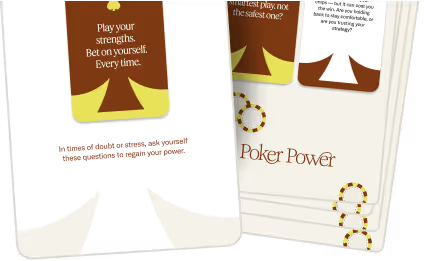Have you ever been in a situation where it felt like you were losing control? You're not alone. We all experience moments of frustration, anger, and anxiety that can be difficult to manage. Applying mindfulness can help you avoid tilting in real life. You'll stay focused and in control, even when things get tough. Understanding the different types of poker tilts can help you better manage stressful situations. With a few simple techniques, you can learn to channel your emotions into a positive outcome, improving your decision-making skills and overall well-being.
What causes tilt?
“Tilt” is the poker term for emotionally fueled poor play. The etymology of the word comes from pinball players physically tilting the table in frustration, only to lose to a “tilt” penalty. Poker tilt often stems from losing in an unexpected or seemingly unfair fashion, though different people experience tilt from and in different ways.
Usually, tilt boils down to cognitive dissonance. If a rude player goes on a winning streak, you might feel that they don’t deserve it. Losing a string of hands you were favored in can feel like the world is out to get you. Even winning unexpectedly can lead you to think you’re on borrowed chips and alter your play negatively.
Poor play as a result of tilt can manifest in a variety of ways. A common response is to play looser and more recklessly. Some players become less aware of tells they may be giving off and less perceptive of others at the table. I know that when I start to feel hot in the face, I play faster and more impulsively. Nobody wants to play tilted, yet once something gets under your skin it can be hard to think clearly.
What are the most common types of tilts?
Stereotypical Tilt
Playing poker entirely “by the book” without making any real-time adjustments during your current game. You’re on auto-pilot and don’t take into account the bigger picture.
If you’re used to playing by the book in your own life, whether it’s personally or professionally you could remain stagnant and end up losing more than you win. Thinking outside of the box, confronting something that scares you or even trying something new once a week can move the meter.
Revenge Tilt
A player, usually to your left who's doing nothing but re-raising, 3-betting and calling widely — causing you to feel angry when you begin losing money. This feeling can often affect how you play, causing you to enact revenge on the player. Take a beat and move your seat.
If you’ve noticed a co-worker has been raising their hand a little too often when it comes to your workload, responsibilities or projects - keep calm and move your cognitive seat. Try and understand the situation before swooping in on their projects and talk to your boss in a positive and curious way. Understand what other projects or responsibilities you can take on, and take back your spotlight.
Passive Tilt
This is the sneakiest of all and once it’s part of your game it may be hard to recognize. You’ll begin checking and calling frequently instead of betting and raising, especially during advantageous circumstances.
You may be a victim of going through the motions in your own life, taking every action as it comes while being a passive actor in your life. Avoid this by being an active participant, forecasting events and remaining agile when the currents change.
Recognizing Your Emotional State
The first step in using poker tilts to your advantage is recognizing when you are in a state of emotional distress. This can be difficult to do because we often don’t realize our emotions until we’re already in the midst of them. It’s important to be aware of your body language and behavior, as these can be signs of an emotional state. For example, if you’re feeling frustrated, you might be clenching your fists or speaking more loudly than usual. If you’re feeling anxious, you might be avoiding eye contact or speaking too quickly.
Strategies for Controlling Your Emotions
Once you’ve identified your emotional state and recognized when you’re starting to tilt, it’s important to take steps to regain control. There are several strategies you can use to do this, including:
- Taking a deep breath: Taking a few deep breaths can help you reduce your anxiety and return to a more relaxed state.
- Reframing the situation: If you’re feeling overwhelmed by the situation, try to reframe it in a positive light. For example, if you’re in a business negotiation, focus on the potential benefits rather than the risks.
- Taking a break: If you’re feeling overwhelmed, it can be helpful to take a break and step away from the situation for a few minutes. This can help you clear your head and return to the situation with a fresh perspective.
- Practicing mindfulness: Mindfulness can help you stay focused and in the present moment, which can be beneficial in stressful situations.
Using these strategies can help you regain control and make better decisions in any situation.
Play Better With Poker Power
Want to know more about tilt pitfalls and how to avoid them on and off the felt? Join us online for our poker classes and change the game, in every way.





